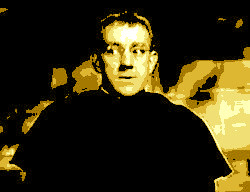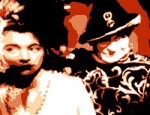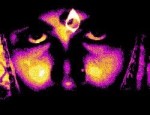Film Review

Complementing Alec Guinness's Father Brown is a likeably villainous Peter Finch who, as a supreme master-of-disguise, always seems to end up looking like Peter Finch. Sid James shows up briefly to chauffeur a seductive-as-ever Joan Greenwood between scenes (nice work if you can get it), Cecil Parker gives a humorous turn as the stressed out bishop Father Brown appears determined to send to an early grave, Bernard Lee is the inspector whose talents do not, evidently, involve catching master criminals and Gérard Oury (long before he became one of France's most successful filmmakers) is even more useless as Lee's French counterpart. Best of the bunch is Ernest Thesiger, who turns in a pleasing cameo as a dusty old French nobleman with a penchant for breaking spectacles. Hamer went on to direct Guinness in two more films - The Scapegoat (1959) and To Paris, with Love (1955) - before his alcohol addiction brought his career to a tragically premature end.
© James Travers 2015
The above content is owned by frenchfilms.org and must not be copied.
Film Synopsis
Undeterred by a tip-off from the police that a French master-criminal, Gustave Flambeau, intends stealing a cross belonging to Saint Augustine, Father Ignatius Brown decides to carry the holy relic to Rome on his person. On the way, he befriends another priest, who turns out to be none other than Flambeau. Once Flambeau has managed to get away with the cross, Father Brown contrives a plan with his friend Lady Warren to bring the criminal out into the open. His motive for doing so is not to see Flambeau put behind bars, but to save his soul. Unfortunately, Flambeau prove to be a wilier adversary than he had supposed and Lady Warren's antique chess set is stolen right under his nose...© James Travers
The above content is owned by frenchfilms.org and must not be copied.
Similar Films
Here are some other films you may enjoy watching:- Volver (2006)
- Rouletabille aviateur (1932)
- Monsieur Verdoux (1947)
- Coup de torchon (1981)
- Tih Minh (1918)
Other related links:
Film Credits
- Director: Robert Hamer
- Script: G.K. Chesterton, Thelma Schnee, Maurice Rapf, Robert Hamer
- Cinematographer: Harry Waxman
- Music: Georges Auric
- Cast: Alec Guinness (Father Brown), Joan Greenwood (Lady Warren), Peter Finch (Gustave Flambeau), Cecil Parker (The Bishop), Bernard Lee (Inspector Valentine), Sid James (Bert Parkinson), Gérard Oury (Inspector Dubois), Ernest Clark (Bishop's Secretary), Aubrey Woods (Charlie), John Salew (Station sergeant), Sam Kydd (Scotland Yard sergeant), John Horsley (Inspector Wilkins), Jack McNaughton (Railway Guard), Hugh Dempster (Man in bowler), Eugene Deckers (French Cavalry Officer), Betty Bascomb (French Widow), Diana Van Proosdy (Waitress), Dino Galvani (Italian Professor), Launce Maraschal (Texan Millionaire), Noel Howlett (Auctioneer)
- Country: UK
- Language: English
- Support: Black and White
- Runtime: 91 min
- Aka: The Detective
French cinema during the Nazi Occupation

The best of Indian cinema

The best French war films ever made
